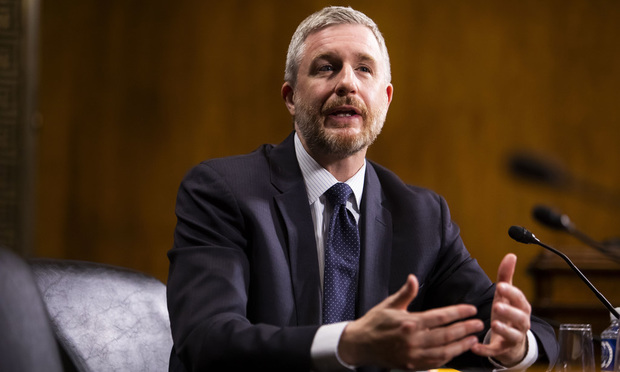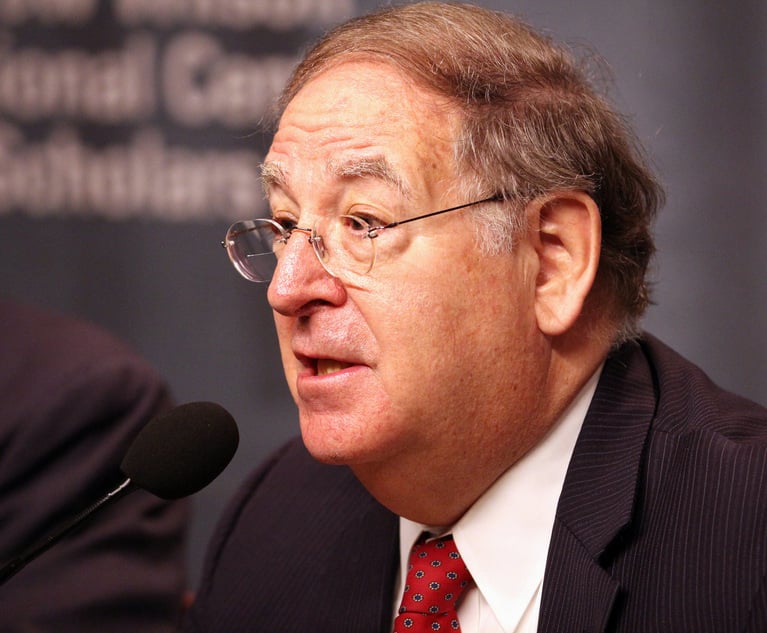Trump's 3rd Circuit Nominee Grilled Over Ties to Chris Christie, Bridgegate
Paul Matey, up for a New Jersey seat on the Third Circuit, got a hearing Tuesday from the Senate Judiciary Committee even though both New Jersey senators have withheld their "blue slips" for his nomination.
November 13, 2018 at 05:14 PM
6 minute read
The original version of this story was published on New Jersey Law Journal
 Paul Matey testifies before the Senate Judiciary Committee during his confirmation hearing to be U.S. circuit judge for the Third Circuit, on Tuesday, Nov. 13, 2018. Photo by Diego M. Radzinschi/ALM
Paul Matey testifies before the Senate Judiciary Committee during his confirmation hearing to be U.S. circuit judge for the Third Circuit, on Tuesday, Nov. 13, 2018. Photo by Diego M. Radzinschi/ALM
Third Circuit nominee Paul Matey faced heavy questioning about his links to scandal-plagued former New Jersey Gov. Chris Christie during Tuesday's Senate Judiciary Committee hearing on his nomination.
Responding to Democratic senators' questions about advice he gave Christie in connection with the Bridgegate scandal and other controversies in the governor's two terms, Matey generally said he had no direct knowledge of the events he was questioned about.
When Christie was U.S. attorney for the District of New Jersey, Matey worked alongside him as an assistant U.S. attorney from 2005 to 2009. Matey was then deputy chief counsel to Christie in the governor's office from 2010 to 2015. After that, he joined University Hospital in Newark, where he stayed until this September, when he joined Lowenstein Sandler in Roseland, New Jersey.
The White House announced Matey's nomination to the U.S. Court of Appeals for the Third Circuit in April to fill the seat vacated by Julio Fuentes, who took senior status.
The committee also held hearings Tuesday on four district court nominations—Jean-Paul Boulee, for the Northern District of Georgia; J. Nicholas Ranjan, for the Western District of Pennsylvania; James David Cain Jr., for the Western District of Louisiana; and Damon Ray Leichty, for the Northern District of Indiana.
At Tuesday's hearing, Sen. Patrick Leahy, D-Vermont, brought up the gridlock that plagued the city of Fort Lee, New Jersey, in 2013 as a result of lane closures on the George Washington Bridge after the city's mayor refused to endorse Christie's gubernatorial re-election campaign. Leahy said Matey “reportedly authorized efforts by the Christie administration officials to solicit political endorsements from mayors, including the Fort Lee mayor, as long as it was technically done after hours.”
Leahy said two Christie administration officials were convicted of criminal charges in connection with the Fort Lee episode, and asked Matey, “do you believe you provided sufficient legal advice?”
Matey responded that he had “no knowledge, or involvement or participation in any of those events,” and that “we certainly took steps to ensure at all times that the highest standards of ethics were followed in the office. Regrettably, that did not appear to happen in this case.”
Sen. Mazie Hirono, D-Hawaii, asked Matey about a 2011 deal by the Christie administration allowing Donald Trump to settle a $30 million tax bill for his Atlantic City casino properties for $5 million.
Matey responded that he had “no knowledge about this matter other than perhaps having read about it in public news accounts. I recollect reading about it but I was never involved in it.”
Hirono also asked Matey about whether he was involved in Christie's decision to grant a deferred prosecution deal to pharmaceutical manufacturer Bristol-Myers Squibb in exchange for the company funding a professorship at Seton Hall University School of Law, which is the alma mater of Matey and Christie.
The settlement “made the Bush administration so uneasy that the Justice Department issued new rules in 2008, limiting prosecutors' discretion to make such deals,” Hirono said.
“I believe that was entered into prior to my joining the office,” Matey said.
“If you had known, would you have advised the U.S. attorney, Mr. Christie, not to engage in this kind of settlement because the obvious quid pro quo is clear?” Hirono asked.
“My work as a United States attorney was always to follow the law faithfully, as given by this Congress. That is how I conducted myself and how I would have conducted myself in any matter,” he said.
Sen. Corey Booker, the former mayor of Newark, said he knew Matey from University Hospital, a major health care facility in that city “that had a lot of problems and scandals.” Booker said an outside rating agency that ranked patient care at hospitals had dropped University Hospital rating from a C to an F in recent years. Booker asked what Matey has done to remedy that situation.
Matey said the quality of patient care was “largely outside of my area as general counsel. But it was something we were always focused on as a hospital.”
The hearing was held even though both New Jersey senators, Robert Menendez and Booker, withheld their “blue slips” for Matey.
Committee Chairman Chuck Grassley, R-Iowa, said Menendez and Booker declined to submit their blue slips because Matey is a conservative, adding that's not a reason to hold back the nomination.
Grassley said the White House “made several extremely generous offers” in an attempt to reach an agreement with Booker and Menendez regarding all six of New Jersey's district and appeals court vacancies.
“In the yearlong consultation period, the New Jersey senators did not agree to even meet with Mr. Matey, nor did they recommend anyone else for the vacancy, and the only reason the New Jersey senators gave for their reluctance to agree to Mr. Matey's nomination is he was too conservative. In my opinion, the White House attempted to meaningfully consult but their efforts were not reciprocated,” Grassley said.
But Booker said Grassley misstated his reason for withholding his blue slip, and that the White House never offered him an opportunity to meet with Matey. He said Grassley “characterized the negotiations with the White House by perhaps only listening to the White House, because I was never approached by you to ask, 'was there a meaningful negotiation?'”
Booker objected to the scheduling of a hearing for Matey before the American Bar Association issued a rating on his qualifications. “Holding a hearing, having not even heard from the ABA—this is one more institutional guardrail that's being knocked down in an unprecedented way by this committee,” Booker said.
This content has been archived. It is available through our partners, LexisNexis® and Bloomberg Law.
To view this content, please continue to their sites.
Not a Lexis Subscriber?
Subscribe Now
Not a Bloomberg Law Subscriber?
Subscribe Now
NOT FOR REPRINT
© 2025 ALM Global, LLC, All Rights Reserved. Request academic re-use from www.copyright.com. All other uses, submit a request to [email protected]. For more information visit Asset & Logo Licensing.
You Might Like
View All
'If the Job Is Better, You Get Better': Chief District Judge Discusses Overcoming Negative Perceptions

'Thoughtful Jurist': Maryland US District Senior Judge Messitte Dies After Short Illness
4 minute read
Sorry. We Can't Get to Your Case: Judge Speaks Out on Judicial Shortages

‘Old Home Week’: Justice Breyer Hears Challenge to Cruise Ship Ordinance in 1st Circuit
Trending Stories
- 1Paul Hastings, Recruiting From Davis Polk, Continues Finance Practice Build
- 2Chancery: Common Stock Worthless in 'Jacobson v. Akademos' and Transaction Was Entirely Fair
- 3'We Neither Like Nor Dislike the Fifth Circuit'
- 4Local Boutique Expands Significantly, Hiring Litigator Who Won $63M Verdict Against City of Miami Commissioner
- 5Senior Associates' Billing Rates See The Biggest Jump
Who Got The Work
J. Brugh Lower of Gibbons has entered an appearance for industrial equipment supplier Devco Corporation in a pending trademark infringement lawsuit. The suit, accusing the defendant of selling knock-off Graco products, was filed Dec. 18 in New Jersey District Court by Rivkin Radler on behalf of Graco Inc. and Graco Minnesota. The case, assigned to U.S. District Judge Zahid N. Quraishi, is 3:24-cv-11294, Graco Inc. et al v. Devco Corporation.
Who Got The Work
Rebecca Maller-Stein and Kent A. Yalowitz of Arnold & Porter Kaye Scholer have entered their appearances for Hanaco Venture Capital and its executives, Lior Prosor and David Frankel, in a pending securities lawsuit. The action, filed on Dec. 24 in New York Southern District Court by Zell, Aron & Co. on behalf of Goldeneye Advisors, accuses the defendants of negligently and fraudulently managing the plaintiff's $1 million investment. The case, assigned to U.S. District Judge Vernon S. Broderick, is 1:24-cv-09918, Goldeneye Advisors, LLC v. Hanaco Venture Capital, Ltd. et al.
Who Got The Work
Attorneys from A&O Shearman has stepped in as defense counsel for Toronto-Dominion Bank and other defendants in a pending securities class action. The suit, filed Dec. 11 in New York Southern District Court by Bleichmar Fonti & Auld, accuses the defendants of concealing the bank's 'pervasive' deficiencies in regards to its compliance with the Bank Secrecy Act and the quality of its anti-money laundering controls. The case, assigned to U.S. District Judge Arun Subramanian, is 1:24-cv-09445, Gonzalez v. The Toronto-Dominion Bank et al.
Who Got The Work
Crown Castle International, a Pennsylvania company providing shared communications infrastructure, has turned to Luke D. Wolf of Gordon Rees Scully Mansukhani to fend off a pending breach-of-contract lawsuit. The court action, filed Nov. 25 in Michigan Eastern District Court by Hooper Hathaway PC on behalf of The Town Residences LLC, accuses Crown Castle of failing to transfer approximately $30,000 in utility payments from T-Mobile in breach of a roof-top lease and assignment agreement. The case, assigned to U.S. District Judge Susan K. Declercq, is 2:24-cv-13131, The Town Residences LLC v. T-Mobile US, Inc. et al.
Who Got The Work
Wilfred P. Coronato and Daniel M. Schwartz of McCarter & English have stepped in as defense counsel to Electrolux Home Products Inc. in a pending product liability lawsuit. The court action, filed Nov. 26 in New York Eastern District Court by Poulos Lopiccolo PC and Nagel Rice LLP on behalf of David Stern, alleges that the defendant's refrigerators’ drawers and shelving repeatedly break and fall apart within months after purchase. The case, assigned to U.S. District Judge Joan M. Azrack, is 2:24-cv-08204, Stern v. Electrolux Home Products, Inc.










